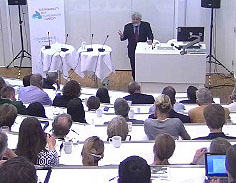IKEA, the Dutch company with Swedish origins that is the world’s largest furniture manufacturer, is considered a model for sustainable business operations. Its leaders are frequently lauded for their integration of social and environmental sustainability practices into their operations, while being transparent about both successes and challenges.
Recently, academics and practitioners, including University of Virginia Darden School of Business Professor Ed Freeman and Erika Herz, associate director of sustainability programs at Darden, took part in a conference, “Sustainability in a Scandinavian Context,” hosted by the Copenhagen Business School. Participants considered the possibilities for new research to help Scandinavian companies like IKEA – and the world – with all aspects of sustainability-related business operations such as energy use, choice of materials in product design and employee benefits.
“Scandinavian companies have historically been frontrunners in addressing social and environmental sustainability issues,” said Herz, who shared her perspectives during a conference panel discussion.
“However, a major challenge for them lies in their ability to continue developing innovative solutions, as their societies become more heterogeneous and stakeholders such as employees, customers and local communities are more vocal about expectations.”
She added, “This is one area where Scandinavian companies may be able to learn from U.S. companies, which have long held culturally and economically diverse employee and customer bases.”
During the panel, which also included leaders from prominent global sustainability centers at Copenhagen Business School and at the University of Minnesota, participants cited opportunities for greater collaboration among business schools on matters of sustainability, and the necessity for business schools to grow their relationships with companies so that they can reach sustainable goals and create more real-world sustainability challenges for students to solve. Herz shared Darden’s progress in the area of waste and energy reductions and the connection between these efforts and academic projects.
Freeman, who has long collaborated with Copenhagen Business School, is no stranger to the integration of sustainability practices in Scandinavian business. Considered the father of “stakeholder theory,” which characterizes effective organizations as those that create value for all stakeholder groups – including employees, customers, local communities and shareholders – Freeman has also incorporated ideas of Scandinavian philosophers into his work.
During his keynote address at the conference, he connected a few of his theories to the Scandinavian business landscape.
“Business has been embedded in society forever. The idea that it is separate is a fallacy,” he said. “In studying how business actually operates, the units of analysis are not simply transactions, but relationships with stakeholders. A company is a place where the interests of stakeholders are interconnected, and the job of the executive is to create as much value as possible for all of these stakeholders without resorting to trading off the interests of one against those of another.”
Freeman also told the group that by engaging all parties, great companies figure out a new frontier of operation where stakeholders are united around a wider purpose.
In the case of Novo Nordisk, a Danish company with almost a century of experience in diabetes care products, the quest to eliminate diabetes brings together its stakeholders.
But such collaboration is not always easy, “Allowing for conflict and conflict resolution is a critical part of achieving this new frontier,” Freeman added.
Discussions also highlighted the Nordic fashion industry. In the sector, there is a paradox between best sustainability practices and the challenge to constantly push out new collections through complex supply chains. Also at play are controversial topics, such as the use of chemicals in textiles and child labor.
In response to these challenges, trend-setters in the fashion industry are designing and implementing codes of conduct for the use of animal products, jewelry manufacturing and child labor – an outcome from dialogue with loyal customers interested in effecting change for sustainability. The industry is also integrating bamboo, hemp and fibers from biowaste in its manufacturing processes.
Jonas Eder-Hansen, development director for the Danish Fashion Institute, spoke at the conference about his organization’s launch of the Nordic Initiative, Clean and Ethical Consumer Project, in collaboration with Business for Social Responsibility.
Marianne Barner, IKEA’s senior sustainability adviser, addressed the very difficult issue of child labor.
“We have evolved from shutting the door of the factory if child labor is discovered to working extensively with philanthropic partners such as Save the Children to address the root causes of child labor,” she said. “We have a far greater impact this way. Women’s empowerment is a major area of effort for us because it is correlated with mitigating the conditions that lead to child labor.”
According to Robert Strand, the conference’s organizer, Scandinavian companies are disproportionately represented at the top of global sustainability indices. For example, they are three times more likely than U.S. companies to be selected for the Dow Jones Sustainability Index.
Strand also noted that the long-term thinking, historically strong partnerships between business and non-governmental organizations, and a democratic workplace culture have enabled Scandinavian companies to naturally embrace sustainability strategies ahead of their counterparts.
“This conference is an excellent venue for Darden to take part in talks with pioneers in sustainability, to learn and to further this important conversation,” Herz said. “From there, we can better support Darden’s corporate partners, many of whom are sustainability leaders as well.”
Media Contact
Article Information
August 5, 2013
/content/darden-experts-scandinavian-sustainability-pioneers-discuss-global-best-practices

